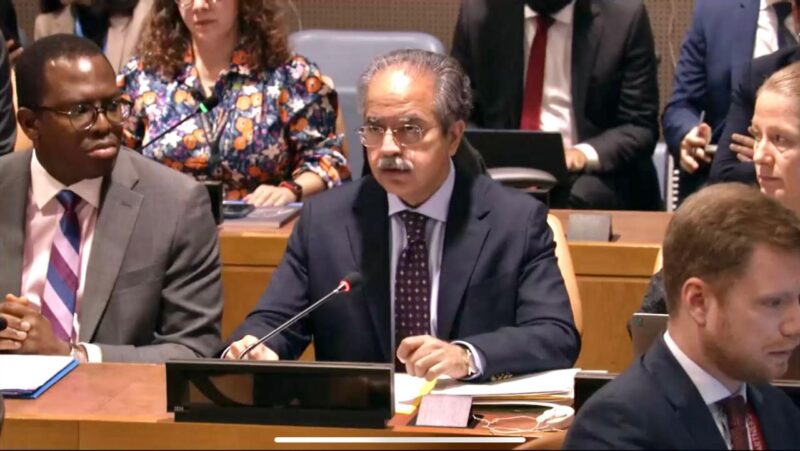Special Correspondent
UNITED NATIONS: Pakistan’s Permanent Representative to the United Nations, Ambassador Asim Iftikhar Ahmad, delivered a strong address at the Third Committee of the UN General Assembly, urging the international community to take decisive action to protect human rights, combat Islamophobia, and ensure the right to self-determination for oppressed peoples.
Addressing the Committee, Ambassador Ahmad highlighted the “dire” global human rights situation, pointing to widespread violence, foreign occupation, discrimination, and systemic injustices affecting millions worldwide. He emphasized that fundamental freedoms continue to be denied in conflict zones, while inequalities and poverty exacerbate instability.
Central to Pakistan’s message was the right to self-determination. Ambassador Ahmad called for urgent action to resolve the humanitarian crisis in Gaza and establish an independent Palestinian state based on pre-1967 borders with Al-Quds Al-Sharif as its capital.
He also highlighted the situation in Kashmir, denouncing “arbitrary detentions, enforced disappearances, and demographic engineering” following India’s measures in 2019, and urged the UN Security Council to facilitate a free and impartial plebiscite.
The Ambassador further warned of the rising threat of Islamophobia worldwide, citing hate speech, discrimination, and attacks on places of worship.
He noted Pakistan-led initiatives, including the UN designation of March 15 as the International Day to Combat Islamophobia and the appointment of a UN Special Envoy on Islamophobia, while calling for a comprehensive UN Action Plan.
Another key concern raised was disinformation, described as a weapon undermining accountability and human rights. Pakistan spearheaded the 2021 UN resolution on Countering Disinformation, which provides a framework to combat misinformation while protecting freedom of expression.
Ambassador Ahmad also stressed the importance of economic, social, and cultural rights, highlighting poverty, hunger, and exclusion as root causes of instability. He reaffirmed the right to development as universal, calling for a just international economic order to support sustainable and equitable growth.
Concluding his remarks, Ambassador Ahmad outlined practical steps for the international community, including implementing human rights resolutions, protecting civilians in conflict zones, regulating digital technologies responsibly, combating hate speech, and ensuring equitable development for all nations.
“The challenges are immense, but the opportunities are greater,” he said. “It is our collective responsibility to ensure that all peoples, everywhere, live in freedom, dignity, and equality.”


Comments are closed.